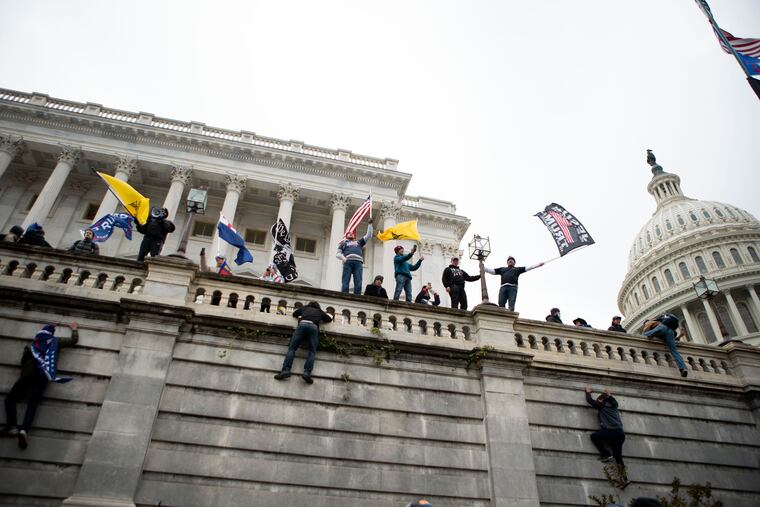Capitol Police say intelligence shows militia group may be plotting to breach the Capitol
The department said it is "prepared for any potential threats."

WASHINGTON - The U.S. Capitol Police said Wednesday that they have information regarding a possible plot by a militant group to breach the Capitol on Thursday, a date that some followers of the QAnon extremist ideology falsely claim will mark former president Donald Trump’s return to the White House.
The department declined to name the militia group or provide additional details, citing the "sensitive nature" of the information. In a statement, the department said it is "prepared for any potential threats."
"We have already made significant security upgrades to include establishing a physical structure and increasing manpower to ensure the protection of Congress, the public and our police officers," police said in the statement.
The Capitol Police and the FBI have been criticized for not acting on intelligence supplied by the FBI's Norfolk field office shortly before the Jan. 6 attack on the Capitol. Rioters easily swarmed through bicycle rack barricades, Capitol and Washington D.C. police officers were overwhelmed by the pure numbers of attackers and the National Guard did not respond to the scene until hours after the siege had begun.
Melissa Smislova, the acting undersecretary of the Office of Intelligence and Analysis in the Department of Homeland Security, said Wednesday that her agency, in coordination with the FBI, issued a bulletin very late Tuesday night or very early Wednesday morning about "extremists discussing March 4 and March 6."
March 4, the original Inauguration Day before the passage of the 20th Amendment in 1932, is the date that some on the far-right have come to believe - wrongly - that Trump will again rise to power. An FBI official had told The Washington Post last week that leaders were aware of the QAnon chatter surrounding March 4, but said, "We don't have any indication of violence or a specific, credible plot at this time."
The FBI said in a statement Wednesday, "While our standard practice is to not comment on specific intelligence products, the FBI is constantly gathering and sharing intelligence with our law enforcement partners. We are always on alert for any potential threats."
The D.C. police declined to discuss their response to the potential threat. "In regards to public safety planning, MPD does not discuss operational tactics," police spokeswoman Alaina Gertz said in an email. "However, we will continue to monitor and assess information in collaboration with our local and federal partners to ensure the public's safety."
Chris Rodriguez, director of D.C.'s Homeland Security and Emergency Management Agency, told the D.C. Council on Wednesday afternoon that Mayor Muriel Bowser, D, acting police chief Robert Contee and acting fire chief John Donnelly had been discussing what to expect.
"At this time, we're aware of this threat," Rodriguez said. "Given some of the security measures in the city and the awareness at all levels of government - state, local and federal - we will stay enhanced, continue to watch and make sure the 4th goes off peacefully," he said.
He added: "We have not seen the types of chatter we saw prior to the [January] 6th, particularly online - the groups do not appear to be mobilizing, and so we do not expect large numbers in the District over the next couple of days."
The warning about another potential threat to Congress comes as a date for President Joe Biden's first address on Capitol Hill has not yet been set. New presidents typically deliver a speech to a joint session of Congress in February.
In January, Bowser requested that 500 members of the D.C. National Guard remain activated through March 12, amid concerns about potential extremist activity tied to three events: Trump's now-concluded impeachment trial, Biden's address and March 4.
In addition to the National Guard and increased police presence, the Capitol grounds have been surrounded by security fencing since the Jan. 6 insurrection.
Last week, the acting Capitol Police chief Yogananda Pittman warned lawmakers that members of extremist groups involved in the Jan. 6 riot "want to blow up the Capitol and kill as many members as possible" during Biden's address.
But after that briefing, members of Congress reacted negatively to the idea of maintaining expansive physical barriers to the Capitol. Both Sen. Tim Kaine, D-Va., and Sen. Chris Van Hollen, D-Md., said the Jan. 6 riot was largely a failure of intelligence, rather than infrastructure. "The idea of just making a permanent fortress or a permanent fence is too much of a knee-jerk solution," Van Hollen said.
Del. Eleanor Holmes Norton, D-D. C., who has been pushing for removal of the fencing around the Capitol, said Wednesday that in light of the new information, the barriers and increased police presence "may have to be there right now. I think they have to respond to the intelligence." But she said she was encouraged to see that some fencing had been reduced earlier in the week, and that she will continue to advocate to "return the people's house to the people."
On Wednesday, Pittman appeared before Congress to ask for a 21% increase to the force's budget to pay for improved security after the Jan. 6 riot, with an emphasis on better support and training for officers, and broader protections for lawmakers.
Pittman said that in the first two months of 2021, officials noted a 93% increase in threats against lawmakers as compared to the same period of 2020. She proposed a security plan for members that includes a focus on security outside of Washington, D.C. She also said that the Capitol Police plan to establish “a dedicated stand-ready force of two platoons (80 officers) at all times,” to reduce the force’s reliance on partner agencies to respond to emergencies.